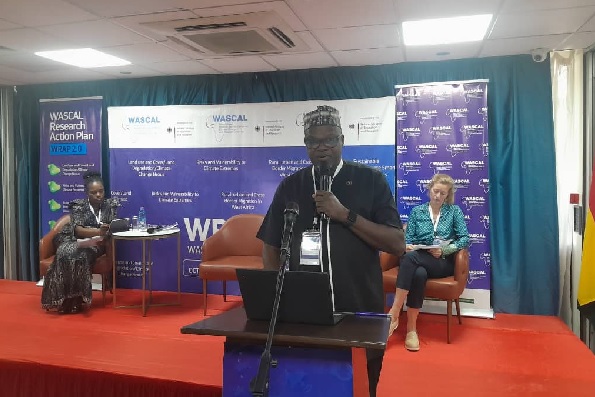
WRAP2.0 project set to help solve climate change challenges
A three-day workshop organized by the West African Science Centre on Climate Change and Land Use (WASCAL) to finalize the WASCAL Research Action Plan (WRAP2.0) has commenced in Accra.
The WRAP2.0 project, funded with support of the German Federal Ministry of High Education and Research (BMBF), and launched in 2020, is a key milestone on the roadmap for the WASCAL to become a Climate and Environmental Services Centre (CESC) in West Africa.
The overall goal of the workshop is to exhibit the achievements of the six projects implemented under the WRAP2.0 and to discuss how they can be integrated into WASCAL’s climate and environmental services development as well as to process the benefits of its stakeholders in West Africa.
Specifically, the workshop will also showcase research and innovation products developed from the different projects, foster multidisciplinary knowledge and information sharing while exchanging ideas and experiences in climate change adaptation options in West Africa.
The participants were drawn from the African and German Consortium, representatives from the BMBF, Erman Embassy in Accra and representatives of WASCAL member countries across the West Africa sub-region.
Achievements
Some of the achievements of the WRAP2.0 include improvement in disaster preparedness, particularly in regions prone to droughts and floods; enhanced the capacity for sustainable resource management and created a lasting impact by building local expertise and fostering homegrown research initiatives.
It has also generated state-of-the-art resources of equipment and huge data resource in meteorological, hydrology and socioeconomic field across the region as well as fostered strong alignment between research communities and those who use research for making decisions.
Research
In presenting an overview of the WRAP2.0 implementation framework, Deputy Director of Research at the WASCAL Competence Centre, Prof. Kehinde Ogunjobi urged the use of scientific research to address the numerous climate change challenges facing Africa.
He expressed confidence in Africa's ability to tackle its own challenges but emphasized that ongoing research, capacity building, and citizen participation are essential for addressing climate change issues on the continent.

“I recommend research to help solve climate change challenges. It is also very important for us to build capacity. For example, WASCAL has a capacity building institution in the Gambia where we do climate change and education as a course,” he said.
“You need to build the Capacity of people for them to understand the impact of climate change before they go to end users to educate them.
It is also very important for citizen perception. Citizens must also take possession of our environment. We cannot continue to pollute, to degrade by cutting down the forest, not managing our water resources very well and block our drains or build on water channels,” he added.
Milestones
The Executive Director of WASCAL, Prof. Emmanuel Ramde expressed that they were at a crossroads in their journey, one marked by both challenges and achievements, as they strive to address climate change and promote sustainable development in West Africa.
“This gathering symbolizes the progress we have made and just like in the stories of our past, it offers us the chance to look beyond the horizon. We are building something transformational and that is a Climate and Environmental Services Centre that will serve our region’s needs, protect our future and shape our legacy.”

“WRAP2.0, which was launched in 2021, represented a call to action. It was a vision grounded in the voices of our people and driven by the priorities of our WASCAL member states. Through countless conversations across 14 ECOWAS countries, we listened to the cries of our lands: the farmers facing unpredictable rains, the fishermen watching the sea change before their eyes and the communities struggling to adapt to a rapidly shifting environment. Their voices shaped the Priority Research Themes that form the bedrock of WRAP2.0,” he said.
Sharing ideas
He added that the workshop goes beyond merely showcasing achievements; it serves as a platform for connection, fostering an environment where ideas can flow freely and minds can collaborate across disciplines.
“Over the next three years, we will showcase the tangible results of the six WRAP2.0 projects that are already changing the face of climate and environmental research in our region. We have the power to translate our research into actions that can guide policy and protect our socio-ecological landscape from harsh effects of climate change. You the scientists, the policymakers and the experts in this room are the weavers of that future,” he stated.
“Finally, I extend a heartfelt call to our member countries. Your support has been the cornerstone of WASCAL’s work. As we continue our journey, I urge you to stay by our side. The strength of our partnerships, the commitment of our governments and the innovative spirit of our institutions will determine the resilience of West Africa in the face of climate change.”

WRAP2.0
The WRAP2.0 project research plan was devised through a stepwise approach that involved national and sub-regional constitutions with stakeholders in 14 of the 15 ECOWAS countries to identify the top regional research priorities that formed its foundation also known as the Priority Research Themes.
The key scientific and technical outcomes of WRAP2.0 are development of climate-smart technologies; capacity building for scientific research; creation of tailored data-driven decision-making tools; generation of high-quality, controlled data and the establishment of state-of-the-art facilities across universities and study site locations; and strengthening regional collaboration and knowledge sharing.
